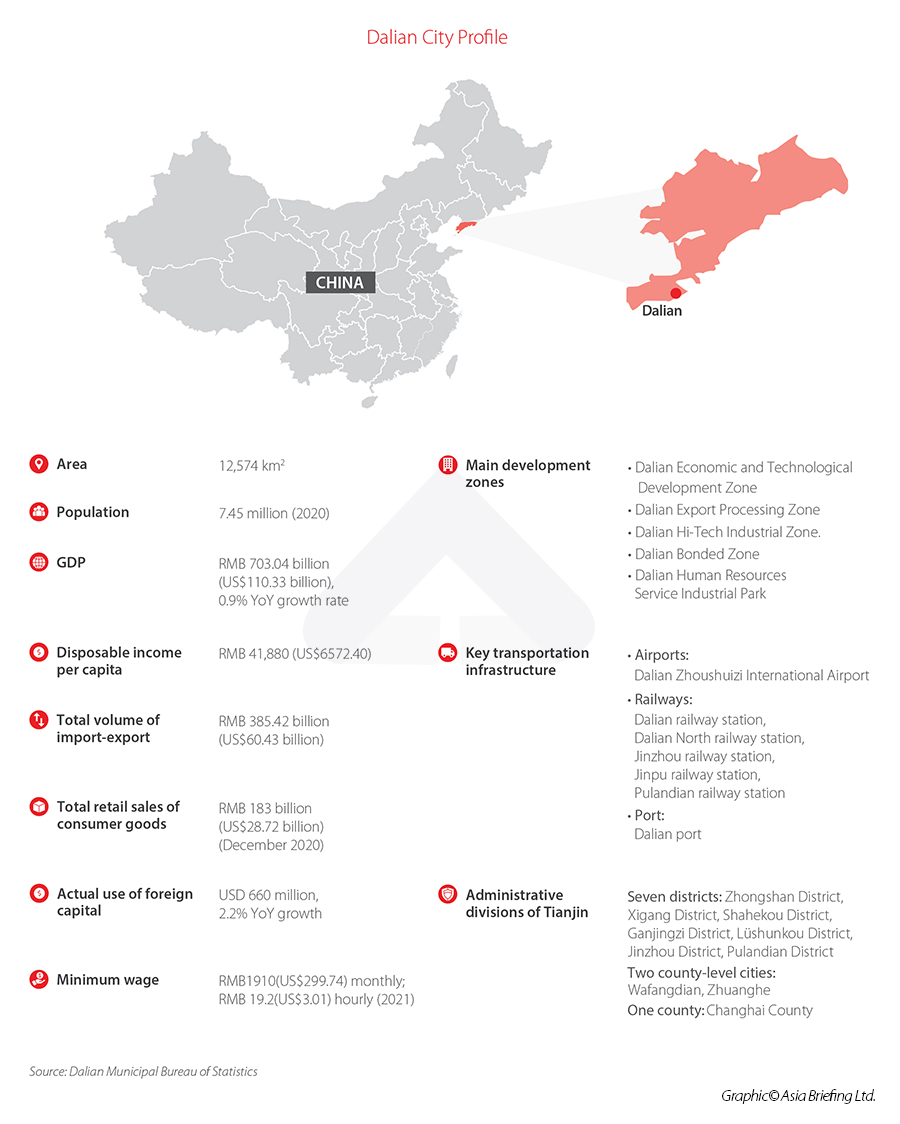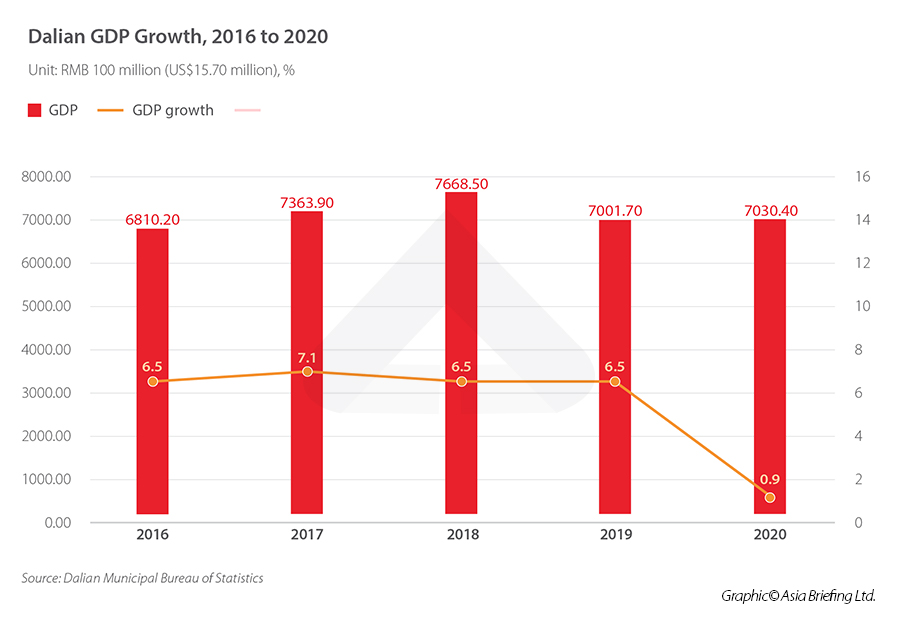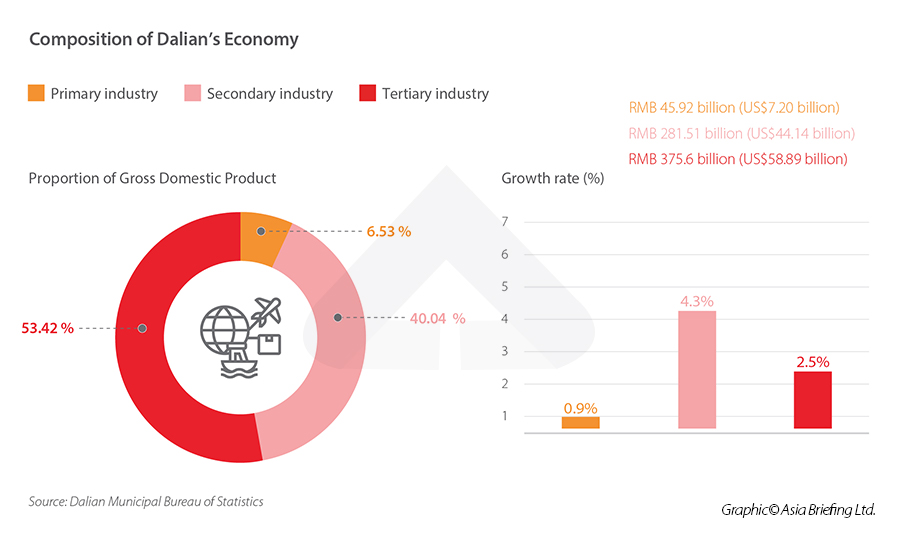Investing in Dalian: Key Industries and Preferential Zones to Set Up
The port city of Dalian is a leading trade and manufacturing hub in northeastern China. While its traditional shipbuilding and petrochemicals industries continue to thrive today, the city’s economy is fast diversifying through the development of key technology and consumer sectors, such as eco-tech and e-commerce. We discuss Dalian’s core industries and development prospects, highlighting the city’s development zones and the preferential policies available to investors.
Dalian is a major sub-provincial port city in Liaoning Province in Northeast China. It is also an important central city and scenic tourist city on the northern coast of China.
Located at the southern end of the Liaodong Peninsula, Dalian is the southernmost city in Liaoning. As a twin star city alongside Shenyang (the provincial capital of Liaoning province), Dalian’s urban economic development has surpassed that of Shenyang in recent years to become the major economic hub in Liaoning Province. Although the heavy industrial economy of the northeastern provinces has seen a downturn in recent years, Dalian has bucked the trend by creating new growth points.
As a financial, HR, shipping, and logistics center for East Asia, Dalian has always held an appeal for foreign firms. The city’s modern services sector includes human resources and financial services and main industries include shipbuilding, machinery, chemicals, oil refinery, textiles, and food processing. Dalian boasts of a deep-water port and is among China’s crucial foreign trade ports. Overall, the city has a beautiful environment, favorable location, and strong industrial base. Its advantage as a seaport city and HR center are the most attractive features for overseas investors.
Dalian’s economic profile
On January 10, 2022, Dalian Development and Reform Commission announced that Dalian’s GDP in 2021 is expected to be about 760 billion yuan, an increase of about eight percent. On May 19, 2021, the Dalian Municipal Bureau of Statistics released the economic performance of Dalian in 2020. It was the only northeastern city in the top 30 contributors to the national GDP in 2020.
According to preliminary calculations, the city’s GDP was RMB 703.04 billion (approx. US$110.34 billion), a year-on-year increase of 0.9 percent. The sector-wise contribution saw the primary industry add value worth RMB 45.92 billion (approx. US$7.20 billion), an increase of 0.9 percent; the secondary industry added value worth RMB 281.51 billion (approx. US$44.14 billion), an increase of 4.3 percent; and the tertiary industry added value worth RMB375.6 billion (approx. US$58.89 billion), a decrease of 2.5 percent.
In 2020, the contribution of the primary, secondary, and tertiary sectors to Dalian’s GDP growth was 6.53 percent, 40.04 percent, and 53.42 percent, respectively. As an important engine for the stable growth of the regional economy, the tertiary/services sector is the main reason for the relative decline observed in 2020 due to the pandemic.
However, as the disease prevention and control situation continue to improve, 2021 economic indicators showed a rebound in performance. In the first three quarters of 2021, for example, Dalian’s tertiary sector’s added value was RMB 291.61 billion (approx. US$45.72 billion), showing a year-on-year increase of 8.2 percent.
Foreign trade and investment
According to customs data from Dalian in 2020, foreign trade imports and exports fell. The total import and export volume was RMB 385.42 billion (approx. US$60.43 billion), a year-on-year decrease of 11.7 percent. Among them, imports were worth RMB 218.16 billion (approx. US$34.20 billion), showing a 10 percent reduction; exports were worth RMB 167.26 billion (approx. US$26.22 billion), a decrease of 13.8 percent. The top five trading partners for Dalian were Japan, the European Union, Saudi Arabia, the United States, and ASEAN.
The General Administration of Customs, however, stated that despite Covid-19’s impact on foreign trade imports and exports in the short term, it is optimistic about the resilient foreign trade development and strong adaptability of enterprises in Dalian in the long run. Relevant departments have successfully introduced a series of policies and measures to support Dalian-based enterprises in overcoming difficulties.
As a result, during 2021, the pace of resumption of work and production of foreign trade companies accelerated. In the first three quarters of 2021, Dalian’s foreign trade’s total import and export value reached RMB 319.04 billion (approx. US$50.02 billion), recording an increase of 7.7 percent. Among them, exports were worth RMB 144.9 billion (approx. US$22.72 billion), an increase of 18.6 percent; imports were RMB 174.14 billion (approx. US$27.30 billion), basically unchanged from the same period as 2020.
According to the data from Dalian Development and Reform Commission, Dalian’s actual direct use of foreign capital is US$1.67 billion US dollars in 2021, an increase of 153 percent. In 2020, there were 247 new foreign-invested enterprises, and the newly increased foreign capital was US$2.03 billion. There were 18 newly approved foreign-funded projects with a total investment of more than US$10 million, including two projects with an investment of more than US$100 million. The actual use of foreign capital was US$660 million, an increase of 2.2 percent over the previous year. Hong Kong, Japan, Germany, the British Virgin Islands, and Singapore rank as the top five sources of foreign capital.
Leading industries
Dalian is an important industrial city in north China. Among the 41 industrial categories established by China’s national statistics, Dalian has industries belonging to 34 categories.
In recent years, Dalian has paid equal attention to industrial restructuring and transformation that follows the path of high-quality development. From 2017 to 2019, Dalian’s industrial added value maintained a double-digit growth rate, ranking first among sub-provincial cities in terms of the growth rate. A sub-provincial city (division) in China is a prefecture-level city governed by a province promoted by half a level. China now has 15 sub-provincial cities: Guangzhou, Wuhan, Harbin, Shenyang, Chengdu, Nanjing, Xi ‘an, Changchun, Jinan, Hangzhou, Dalian, Qingdao, Shenzhen, Xiamen, and Ningbo. In 2020, despite the increasing downward pressure on the industrial economy due to the Covid-19 pandemic, Dalian still recorded industrial growth. The added value of industries above the designated size increased by 3.8 percent yearly. Industrial enterprises above the designated size refer to enterprises whose annual output of RMB 20 million (approx. US$3.13 billion) or more is from their main business.
The following sections briefly introduce Dalian’s four pillar industries, namely shipbuilding, equipment manufacturing, petrochemical, and consumer goods industry.
Shipbuilding industry
The Dalian Shipbuilding Industry Group Co., Ltd. (DSIC) is the largest and internationally renowned shipbuilding enterprise in China. It is the biggest shipyard in China and a leading shipbuilding contract holder worldwide. DSIC provides customers with complete life cycle services, including product R&D, product design, construction, ship repair, conversion, and ship scrapping. DSIC is also an equipment manufacturing enterprise group that brings together five major industries – military industry, civil shipbuilding, marine engineering equipment, ship repair/dismantling, and heavy industry.
During the 11th and 12th Five-Year Plan periods, the shipbuilding group maintained a growth rate of more than 20 percent for eight consecutive years. It is China’s first shipbuilding enterprise with a total industrial output value and sales revenue of “double exceeding 20 billion” and is among the world’s top five shipbuilding enterprises.
Equipment manufacturing industry
Dalian is an important equipment manufacturing industry base in China. The city is a base for the automobile and parts manufacturing industry. It is China’s largest production base for combined machine tool and national-level computer numerical control (CNC) machine tool industrialization as well as CNC functional component R&D and manufacturing. Dalian plans to create a world-class intelligent network industrial cluster with Baidu Apollo and other companies. Dalian’s rail transit equipment manufacturing industry is one of China’s important locomotive industrial bases. There are many well-known machine tool enterprises in the jurisdiction, such as General Technology Dalian Machine Tool, Koyo Technology Group, Yamazaki Mazak, and GROB Machine Tool. Dalian’s technological equipment manufacturing industry is developing in an intelligent service-oriented direction. Major breakthroughs have been made in construction machinery R&D, aircraft manufacturing equipment, nuclear power equipment, and petrochemical general equipment.
Dalian’s key basic parts manufacturing industry has the title of “Bearing Capital of China,” “National Large-scale Bearing Engineering Technology Research Center,” and “Mutual Inductor Capital of China.” Medium and low voltage transformers manufactured in Dalian occupy more than 50 percent of the domestic market share and high voltage transformers manufactured in Dalian occupy more than 15 percent of the national market share.
Petrochemical industry
Dalian is one of China’s important petrochemical bases with a good foundation for developing the petrochemical industry. There are 172 enterprises above the designated size in the city, which has established a complete industrial system of petroleum refining, petrochemicals, basic chemical raw materials, and so on. In 2020, Dalian’s petrochemical industry achieved an output value of RMB 276.1 billion (approx. US$43.29 billion) with the manufacturing sector contributing 40.79 percent. Furthermore, petrochemical achieved an increased value of RMB 52.62 billion (approx. US$8.25 billion) with the manufacturing sector contributing 33.38 percent to this increase in output value. The petrochemical industry is the top contributor to Dalian’s industrial economy for three consecutive years.
Consumer goods industry
In 2019, Dalian’s consumer goods industry achieved a total industrial output value of RMB 114.3 billion (approx. US$17.92 billion), accounting for about 16 percent of the city’s industry output. The value-added accounts for about 12 percent of the city’s industry economy. There are more than 640 enterprises above the designated size. Leading industries include food processing, furniture, wood, biomedicine, clothing, and textiles, etc. Local industrial clusters, such as the biomedical industry cluster, the Zhuanghe furniture industry cluster, the Zhuanghe agricultural product deep processing industry cluster, and the Pulandian clothing industry cluster, have been formed. The expo industry, meanwhile, has also grown significantly. Dalian has successfully hosted the China International Cultural Industry Expo, China International Furniture Exhibition, China Arts and Crafts Expo, and Chin Light Industry Commodity Expo.
Human resource services industry
Dalian’s HR service industry has become a core component of the city modern services sector. As of 2019, Dalian has 509 HR service organizations, accounting for about half of the Liaoning province, employing about 13,000 people, and having an annual operating income of nearly RMB 10 billion (approx. US$1.75 billion).
In 2021, the “Fifth Dalian Human Resources Service Innovation and High-end Development Summit” was successfully held. The summit condensed the essence of the industry and demonstrated the market’s vitality. It has become the only comprehensive exhibition event for human resources services in China’s Northeast.
Dalian’s HR service projects have also been moving towards precision and diversification with the improvement of service capabilities. The service products extend from the traditional job introduction, labor dispatch, and personnel agency to the high end of the value chain. Specifically, it includes action plans, such as cultivating key enterprises and leading talents, constructing industrial parks, and Internet and HR services to promote the rational flow and optimal allocation of human resources.
For example, the HR departments of Ernst & Young and Unilever are in Dalian. HR jobs such as recruitment, leave management, and payroll processing are all done remotely in Dalian. Dalian’s HR service business has formed an agglomeration effect.
Where to set up in Dalian
Dalian Economic and Technological Development Zone
Dalian Economic and Technological Development Zone is one of the functional zones in the Jinzhou District of Dalian. It was established in September 1984 with the approval of the State Council. It is China’s first national-level economic and technological development zone known as the “Shenzhou No. one Development Zone”.
It has formed three hundred-billion-level industrial clusters in petrochemical, equipment manufacturing, and electronic information, and six ten-billion-level industrial clusters in biomedicine, new materials, automobiles and parts, modern metallurgy, semiconductors, and food processing. More than 3,500 foreign-invested companies from 49 countries are invested in the zone, including 73 of the world’s top 500 companies. A total of 91 projects have been invested, and more than 40 projects with a total investment of more than US$100 million. World-class companies such as Intel, BorgWarner, Pfizer, ThyssenKrupp, Fuji Iceberg, Yamazaki Mazat, Volkswagen Engine, Shilla Auto Parts, etc., have settled in the development zone.
Dalian High-Tech Industrial Zone
Dalian High-Tech Industrial Zone was the first batch of national high-tech industrial development zones approved by the state in March 1991. It is the core area of Dalian’s high-tech industry base and the pilot area of Dalian’s opening and science and technology. The zone currently focuses on key high-tech fields, such as electronic information, mechatronics, new materials, bioengineering, high-efficiency energy-saving, and environmental protection.
More than 100 Fortune 500 companies, such as IBM, HP, Ericsson, and Dell, have accounted for foreign investment worth US$290 million.
Dalian Bonded Zone
Dalian Bonded Zone is in the Jinzhou District of Dalian City and was established with the approval of the State Council of the People’s Republic of China in May 1992. It boasts of being a comprehensive economic region with the highest degree of openness and the best policies in mainland China. The Dalian Bonded Zone is now China’s largest free trade zone. It is the country’s only special supervision zone that integrates the management of a bonded zone, a bonded port area, and an export processing zone. It has attracted some leading industries, such as electronics, machinery, and plastics.
NEarly 1,000 companies from more than 30 countries and regions, including Hong Kong, the United States, Japan, South Korea, Singapore, Taiwan, and Canada, had invested in the Dalian Bonded Zone.
Dalian Human Resources Service Industrial Park
Dalian Human Resources Service Industrial Park was proposed for construction by the Dalian Ecological Technology Innovation Urban Management Committee in July 2015. On December 5, 2019, the Dalian Human Resources Service Industrial Park was divided into two core areas: the High-Tech Industrial Zone and the Ecological Technology (Eco-Tech) Innovation City.
High-Tech Zone
The High-Tech Zone relies on the characteristic and advantageous industries of the zone, focusing on software and information technology service industries, exploring and cultivating medium and high-end human resource service formats, innovating human resource service products, and developing new human resource service technologies.
Eco-Tech Innovation City
The Eco-Tech Innovation City area focuses on new technology and new economy and gathers universities and industry leaders to cultivate mid-and high-end talents jointly. Generally, it aims to create a human resource sharing ecosystem with function integration, industry clustering, and development concentration.
City-wide incentive policies
In order to attract foreign investment and create a good business environment in Dalian, the city’s government has formulated and issued the “Several Policies and Measures for Expanding Opening-up and Actively Utilizing Foreign Capital in Dalian“. The city also issued the “Notice of Dalian City on several Measures to Accelerate the development of human Resource Service Industry” to promote the development of its human resources sector.
We list some prominent support policies below.
Support policies for foreign investment in key industries:
For newly established foreign-funded manufacturing enterprises and modern service enterprises, rewards will be given to the enterprises and senior management personnel based on the actual paid-in registered capital, operating income, capital increase, and production expansion.
Support policy for foreign investment in the establishment of headquarters:
Different amounts of rewards and office subsidies will be given to enterprises and senior management personnel for newly established regional headquarters, according to different industries, operating income, capital increase, and production expansion.
Support policy for foreign investors to carry out R&D cooperation:
For foreign investors carrying out scientific research and innovation cooperation in Dalian, the government will provide different subsidies according to the number of personnel, various preferential tax policies, and convenient service measures for R&D personnel.
Support policies for foreign-invested equity investment enterprises:
Foreign equity investment enterprises that invest in scientific and technological innovation enterprises in Dalian will be rewarded to their managers according to the level of investment.
Support policies to reduce business operating costs:
For recognized technologically advanced service enterprises, corporate income tax is levied at a reduced rate of 15 percent in accordance with relevant national regulations. Facilitated service measures are provided in customs clearance, entry-exit inspection, and quarantine.
Land support policies for foreign investment projects:
Encourage the implementation of industrial land supply methods, such as flexible transfer, long-term lease, first lease and transfer, and combination of leases and leases to reduce the cost of land use for enterprises.
Support policies for expanding financing channels for foreign-funded enterprises:
The government will provide subsidies to support foreign-invested enterprises to list on the Main Board, SME Board, Growth Enterprise Market, and overseas in accordance with laws and regulations.
Support policies for fair competition between foreign-funded and domestic enterprises:
Encourage foreign investment to participate in the construction of infrastructure projects. With more convenient conditions, attract foreign investment to participate in new energy power stations, airports, ports, roads, bridges, subways, water supply, parking lots, garbage treatment, sewage treatment, and other infrastructure projects.
Promote investment facilitation support policies:
In the development zone, priority is given to the introduction of internationally renowned arbitration agencies, law firms, accounting firms, certification agencies, evaluation agencies, and other intermediary services. Policy support is also given in terms of office space, talent introduction, and entry and exit convenience. The government also simplifies the guidelines and management procedures for foreign-invested projects.
Support policies for the introduction of well-known human resource service organizations:
Give a certain period of preferential office housing policies and certain financial rewards to well-known foreign human resource service organizations to settle in the Sino-Japanese (Dalian) Local Development Cooperation Demonstration Zone and Dalian Human Resources Service Industrial Park.
About Us
China Briefing is written and produced by Dezan Shira & Associates. The practice assists foreign investors into China and has done so since 1992 through offices in Beijing, Tianjin, Dalian, Qingdao, Shanghai, Hangzhou, Ningbo, Suzhou, Guangzhou, Dongguan, Zhongshan, Shenzhen, and Hong Kong. Please contact the firm for assistance in China at china@dezshira.com.
Dezan Shira & Associates has offices in Vietnam, Indonesia, Singapore, United States, Germany, Italy, India, and Russia, in addition to our trade research facilities along the Belt & Road Initiative. We also have partner firms assisting foreign investors in The Philippines, Malaysia, Thailand, Bangladesh.
- Previous Article Belt and Road Weekly Investor Intelligence #63
- Next Article China Merges Three Rare Earths State-Owned Entities to Increase Pricing Power and Efficiency













